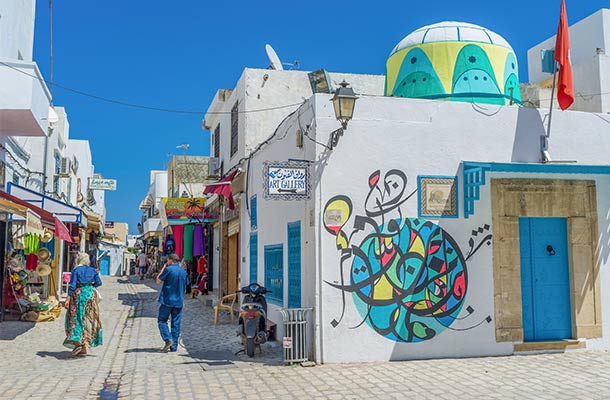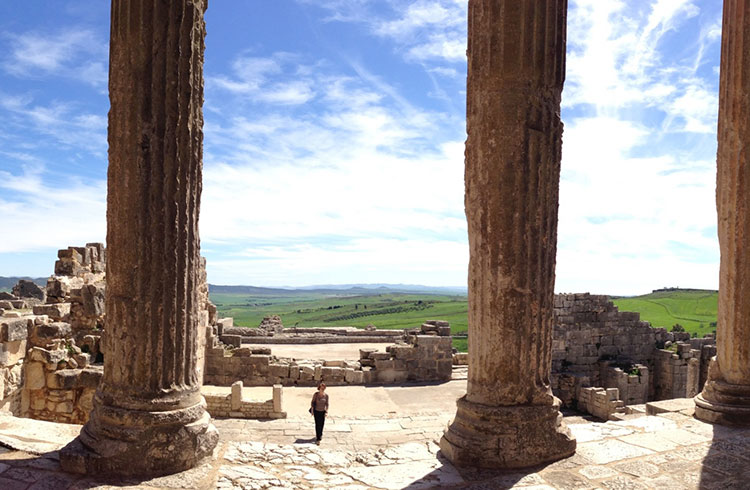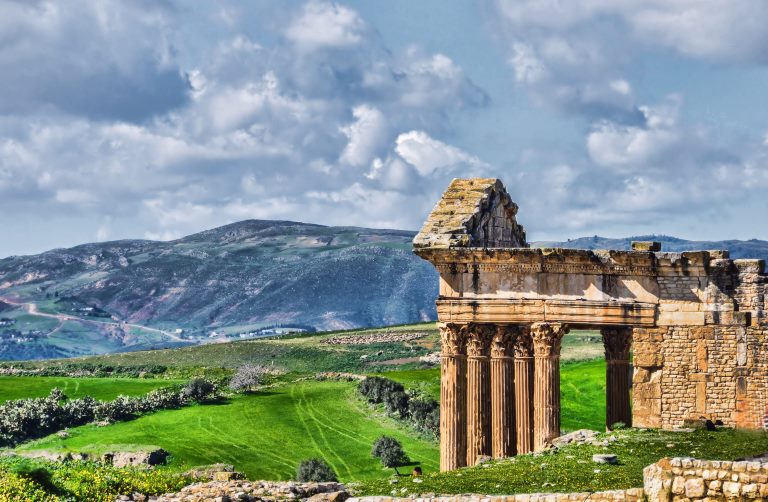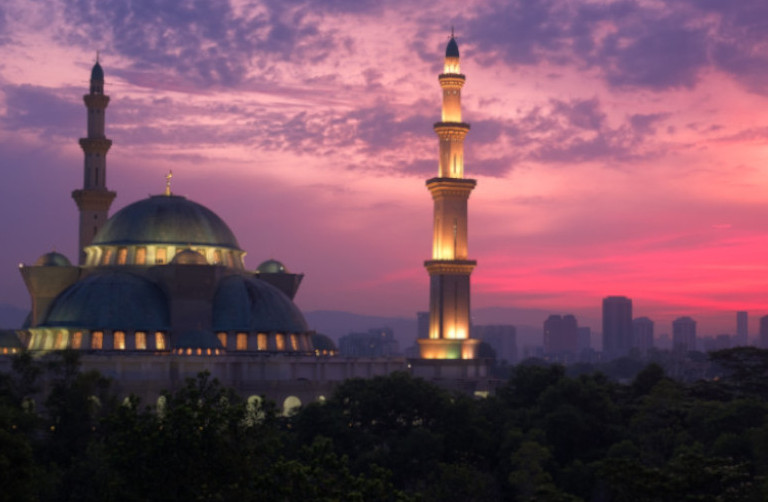Respecting Local Laws and Culture in Tunisia
Tunisia is a Muslim country, and it's important to respect Tunisian culture as well as local laws regarding drugs, photography, and currency.
 Photo © iStock
Photo © iStock
Buying antiquities, being careless about what you photograph, and carrying Tunisian money out of the country can get you into trouble if you don't follow the local laws.
The southern desert areas are quite traditional, but the northern beach resorts (where most travelers go) are more cosmopolitan, and have a fairly European style, so you can be a little more relaxed with how you dress. However, it's still important to dress modestly, especially if you're a woman.
If you're coming to Tunisia after spending a little time in France, be aware that topless sunbathing in public is not acceptable in Tunisia and will cause both offense and unwanted attention.
The dominant language spoken in Tunisia is Tunisian Arabic, though many natives also speak French, especially in the north.
Below are some other useful tips for knowing what's forbidden, and navigating the culture and customs in Tunisia.
- Public displays of affection
- Smuggling of antiquities
- Rules regarding photography
- Drugs in Tunisia
- No free medical for non-citizens
- Currency laws in Tunisia
- Road rules (and whether they are followed)
- Road conditions in Tunisia
Public displays of affection
Even in the less conservative north, Tunisian law applies to personal relationships. Like many Muslim countries, homosexuality is illegal. Public displays of affection between same-sex couples and talking publicly about homosexuality are taboo.
It‘s technically illegal for mixed-gender couples who are unmarried to share a room together. It's not much of a problem in western-style hotels, but elsewhere, just say “wife/husband” rather than “boyfriend/girlfriend” when talking to hotel staff. A gold ring worn on the appropriate finger can smooth the way, too.
Smuggling of antiquities
There is a reasonable amount of antiquities smuggling in Tunisia. People who try to remove antiquities without the right government permits may be arrested, and have a very long delay added to their departure.
Make very sure that, if any of your purchases are antique, you obtain permission. Getting arrested when you‘re trying to leave will definitely ruin your experience.
Rules regarding photography
Tunisia does not allow photographs to be taken of embassies, military, or government buildings, as well as other sensitive places. If you‘re in doubt, look around for one of those “no camera” signs. If you see one, don‘t take the photo.
As in most countries, Tunisians don’t like to be photographed without their permission. Ask first, and you’ll likely be rewarded with a great photo, an interesting cultural interaction, or, at worst, a polite no.
Drugs in Tunisia
Like many countries in the world, drugs are illegal in Tunisia. However, Tunisia tends to have somewhat harsher drug laws than western nations. Use and trafficking are obviously serious offenses, but the possession of even small amounts of “soft” drugs can result in imprisonment. In case you were wondering, yes, one joint or even a small amount of hash or marijuana can result in being locked up.
No free medical for non-citizens
Tunisia has a strong medical system for Tunisian citizens, but not for people who aren‘t. If you do require medical attention in Tunisia, be aware that private hospitals and clinics can be very expensive, and payment is required immediately.
Currency laws in Tunisia
There are some interesting laws regarding currency in Tunisia, and you should make sure you’re aware of them if you’re planning on going. It’s actually illegal to either import or export Tunisian money.
If you're a cash-only type of traveler, take the amount of money you want to spend into the country in your local currency, and convert it into Tunisian Dinars as you need it. Be sure that you declare how much currency (in cash) you’re bringing into the country, or it won’t be leaving with you. Keep receipts for every money change transaction.
Those of us who use the ATM to access funds won't have a problem (although it's always a good idea to keep the receipts ATMs spit out).
Road rules (and whether they are followed)
If you haven’t ever driven in a non-Western country before, driving in Tunisia will be an interesting experience. It's common for local drivers to ignore road regulations, even when police are clearly visible.
Pedestrians have right of way, but not all drivers follow this rule. Pedestrians also frequently run between traffic, even on major highways.
People who ride bicycles, motorcycles, and motor scooters will regularly weave through traffic, attempting to squeeze through incredibly narrow spaces at high speeds. It doesn’t help that few of these vehicles have adequate lights or reflectors, making them difficult to see.
Tunisia has a high number of police and military checkpoints, and if you come across one of these, be sensible and approach slowly. Speeding towards a checkpoint is a good way to make several men with automatic weapons very nervous indeed. Checkpoint authorities tend to be polite to foreign travelers, but you must be ready to present photo ID upon request, and they may detain you if you don‘t have it, particularly if you are near one of the more troubled border regions. Tourists must carry ID with them at all times.
Road conditions in Tunisia
If you are planning on driving outside of the urban areas, be aware that conditions vary. The Tunisian road network is relatively modern and of good quality overall, but road quality can deteriorate rapidly, particularly in the southern part of the country, where many roads are unpaved and/or full of potholes that are covered with blowing sand.
Traveling cross-country and off-road means traveling in the desert. If you‘re not used to that, the advice is fairly straight forward and should be strictly adhered to.
For a start, make sure you‘re traveling in a vehicle that‘s capable of off-road desert travel, which means sedans are out and you really need a four-wheel drive.
Make certain you have enough water and food, and pack a little extra just in case.
Travel in multiple cars so that, if one breaks down, you can get back to civilization in one of the other vehicles.
Take a GPS with you, but be aware that there are many areas in the south that have very little mobile phone coverage, and often none at all.
Lastly, while it does get incredibly hot in summer (as high as 115°F/46°C), the desert is also subject to chilly conditions and night and can even get close to freezing in winter. Even when you‘re traveling in summer, you need to bring something warm for the evening.
Related articles
Simple and flexible travel insurance
You can buy at home or while traveling, and claim online from anywhere in the world. With 150+ adventure activities covered and 24/7 emergency assistance.
Get a quote


22 Comments
Hi there. I have a holiday booked to Tunisia. I have a lot of medication I have to take including Morphine. This comes both in patch form and liquid form. Am I allowed to bring it with me into this country.
Thank you
Hi. I enjoy getting my running shoes on and going for a jog. Is this exceptable
Thanks
Dears:
I have xanax prescribed by my doctor due to a past trauma suffered at work, is it allowed in tunis?
Regards
Poorly written and researched article. It's the Tunisian DINAR not dollar! Did the writer of this piece even visit the country or just conduct 5mins of lazy internet research?
Are males allowed to sunbath topless In Hammamet?
Yes @rachel
Hello
I want to ask can you vape in Tunisia or is there strict rules??
Grateful for any help
Tunisia would be better if we knew traditions and culture
The article didn't really focus much on the local customs which is something I understand because each region (sometimes each FAMILY) in my country has its own customs.
Anyway, vaping and smoking regular cigarettes are allowed (just please don't smoke in a closed area, even if you see the locals do so, it makes me sad.).
Sunbathing topless is also okay, but for the ladies, it wouldn't be a great idea to do so on a public beach, hotel pools and hotel beaches are fine though.
These are some things that you should consider when you're wandering around.
* Don't say no to food
The Tunisian cuisine has been developed over the course of +3000 years and thus has many influences, you will notice how colorful, diverse and spicy the food is and I absolutely recommend that you try it all. Yes, ALL.
When a local offers you food or tea, it is best to accept it and thank them.
If you don't feel like it you can go for the allergy excuse or simply smile, shake your head in a no, and place your right hand on your chest (you can add a thank you in both Eng or Fr, or "hamdoulelleh, aaychek" if you feel that your game in the Tunisian dialect is strong enough.)
* No booze.
I'm kidding.
You can drink in hotels and restaurants and enjoy the Tunisian wine varieties, but not while casually walking down the street.
Tunisia is a Muslim country (though I disagree), and alcohol public consumption is not very openly accepted (but we do drink when you're not looking *wink wink*)
* No hugs
When you're greeting someone both male or female, shake their right hand with your right hand and you may go with the European style (one kiss on each cheek) but that's generally with people you're close with. Yet again this can be different in some regions, as some girls/boys would only shake hands with you if you're a male, shake hands with you AND give you the two kisses (that can turn into four, ugh) if you're a female.
The safe option is to shake hands and see if the person would move in aiming for the cheeks.
and of course, NO MAKING OUT IN PUBLIC, you do not want to get caught, REALLY.
* Hats and sunglasses, take them off
it is of respect to take off your hat when you enter somewhere 'closed' and to also remove your sunglasses when you're having a conversation (we like eye contact, but not too much)
* Your outfits (mostly to females, yes I KNOW.)
Although we have a reputation of being a "free" country, we're not that free.
Locals in touristic locations, particularly in the North, are more open and okay with a tattooed girl walking around in a tank top and shorts (though they might be more sensitive when it's Ramadan and that's a whole other subject).
It's not like non-northern residents would chase after you and hurt you if you show some skin, it's just that you would be cat-called, stared at, drooled over ... etc. But if you're planning on visiting mosques or any sacred places, girls are supposed to cover their heads with a scarf and show nothing but their feet, hands (not arms) and face, (I would pack long sleeves and long skirt/dress for that occasion). As for men in mosques, most outfits are okay, except for shorts. AND BOTH need to take off their shoes if they see anyone else taking theirs off at the entrance of the mosque/holy place (make sure you don't forget where you placed them tho *wink wink*)
* Gifts and not cash (although some wouldn't mind both)
If you're visiting a Tunisian family or meeting with them for the first time, don't show up empty-handed. You can buy soft drinks, sweets, a decorative piece or anything you're sure that your guests would enjoy but don't offer cash unless it's to a child (not too big amounts, and if it's a baby, place it in their cradle when they're in it or give it to the baby, I know it sounds crazy, but we do it.)
This is all I can think of for now, you can message me on instagram (same username) if you have any questions.
And I just want to say that we're generally very hospital and welcoming, so please don't stress too much over coming to visit (not if you're an alcohoolic visibly tattooed young woman with a tendency to wear extremely tight clothes and a crazy hair style. jk jk)
(i didn't review what I wrote, excuse my grammar
what are the customs regarding gifts for local business partners? foreigner visiting.
In tunisia ( mostly in The capital and in well Known cities) females can wear almost everything you want. At night time when clubs and bars are open do not be shy to wear your classy party outfit. Do not expect not to be catcalled (because we know you are beautiful) but just ignore and walk your way.
A good tips is if you are an English speaker, try learning some French words. Not all Tunisians speak English ): but we fully speak French.
If you do not find your way ask some locals to find yourself ( google maps doesnt work very well here ) they will be pleased to help you
Thank you. Very informative. My first time visiting will be this upcoming February 2019.
I would like to visit Tunisia but I am very afraid. I have been fb friends with a Tunisian man for the past 2 yrs. Before anyone even asks no he has not asked me to marry him or send money. For us this is the modern day Pen pal. I have a milestone birthday coming up this year and would like to go but I will be traveling alone. My main question is am I allowed to visit with him or go site seeing with him? Is it even safe for me to visit Tunisia by myself? Someone please guide me.
Foreigner in Tunisia right now. 1 month trip.
My recommendation is don't come here. It's really not worth it. Only reason I am still here is because I maxed out on my 3 months Shengen limit. Need to spend a month out of Europe.
They're big on scamming tourists. The country is very dirty (garbage everywhere), Very conservative - besides the anti gay garbage, kissing your girlfriend on the lips in public will get you 6 months in jail. And whatever historical and cultural items exist have been vandalized to extremes and the sites are garbage dumps and parkour courses. Same with the Bardo museum, it is mainly a playground for Tunisian kids to run around in, and climb on thousand year old statues and palm and rub against paintings and mosaics.
Overall, whatever exists here that is nice is either being shat on by the locals, mired in conservative stupidity or will end up with you being scammed. Honestly, go somewhere else, this country has absolutely nothing worthwhile to offer.
D arevu visited tunisia yet or u still waiting cause im going there now alone and Im not sure what to think about it
for the people that aren’t sure about going to tunisia, i really recommend going. i try going there every year, i could never get bored of travelling in tunisia. most locals are extremely polite however you can get the few travelling Algerians that may cat call you. also if you’re going to a crowded market it’s advised to keep hold of all your things and if you’re wearing a backpack i’d wear it on the front as there’s a lot of petty theft and pickpocketing. you should make sure you know the tunisian dinar currency as some people may take more that they need if you’re not sure about the money while paying for things.
Question, can we take folding pocket knives to Tunisia if in my checked suitcase? Less than 3 inches long, literally for carving my name into wood (just a silly hobby).
Was going to book because of extremely low prices.... would be for three lads wanting to stay at a resort with private beech looking to make the most out of the all inclusive bar. Would the hotel have vodka/gin/any spirits.. also would it be acceptable to be completely paralytic drunk while at the resort??
I need to know what the needs of the people in tunisia are before the 15th of november 2019. please reply
I have heard that it is illegal for Tunisians to shop online--is this true?
greetings,
i am particularly interested in the currency laws of Tunisia. i am William Hardy a resident of Australia i wish to come do a masters program in your univeristies. i wish to know more about the currency laws inline with foreign people who come to follow a school program in you country. thanks hope to hear from you soon.
regards.
Ugh. Tunisia sounds horrid. I’m marking it off my list of humane places to visit.